#Knowledge Tv Global
Explore tagged Tumblr posts
Text
Hungry for Good Omens 3 crumbs of information? Let’s see what I’ve found and speculate a bit about cast members, filming locations, and… trees! As always, please tag accordingly, share only with the fans consenting to know potential spoilers, and get yourself something to drink since it’s going to be a longer read.

News flash: both Ned Dennehy (well-known to Good Omens fans as Hastur) and Sean Pertwee (recently revealed to star in the Finale as Brian Cameron) admitted to have been working on location in Tenerife during the film’s production time slot (January and early February, respectively). In Dennehy’s case, even providing a rather intimately close look at his character.



The location alone isn’t particularly surprising, as the Canary Islands and Tenerife in particular are currently experiencing an influx of international productions, including several TV shows by global streamers, making use of the favourable weather and prices. But Dennehy’s post, additionally liked by a Good Omens crew member, seems somewhat suggestive.
In the Instagram story above, Sean Pertwee called 14 January 2025 his last day on the shoot in Tenerife and subsequently traveled to London and Edinburgh, from where he shared another video three weeks later.
Now, technically the Tenerife film set could be a part of Pertwee’s NCIS: Tony & Ziva job he started last autumn. However, that would imply that he plays a greater role in the upcoming production than the currently available promotional materials imply, and the location stamp in the bottom right corner, Drago Milenario, is too deliciously Good Omens coded to overlook it.
It isn’t even a place, really, but a living organism. A plant. A tree.

Meet Drago Milenario, also know as El Drago, a natural monument and symbol of Tenerife. The oldest and largest living specimen of the endemic Dracaena draco (dragon tree), it is said to be a thousand years old and stand at 18 metres high with a 20-metre perimeter. “Great big bugger,” as Aziraphale would say.
There has been much debate over the age of the tree, and some even say that it may be over 5000 years old; more recent estimates seem more conservative and suggest that El Drago is no more than 800 to 1000 years old. It is difficult to say unambiguously, because the traditional method of counting rings is not applicable in this case — dracaena has no rings.
Its home, the Millennial Dragon Tree Park, or Parque del Drago, in Icod de los Vinos, is a sacred place and a burial zone of Tenerife’s original inhabitants, the Guanches. Members of the Guanche people venerated El Drago as a divine tree; a symbol of wisdom and fertility, believed to have magical powers, granting longevity and warding off evil spirits. Its blood-red oil or sap is called dragon's blood and historically used to treat wounds and embalm corpses. According to local legends, that’s because slain dragons don’t actually die, but rather turn into dragon trees like this one.

The dragon part of the story sounds objectively cool, but if we overlook it for a second, we might notice why the connection to Good Omens is so strong here. When asked about trees in the show’s context, one’s first point of reference is quite naturally the Garden of Eden scene and the shot above featuring the Tree of Knowledge of Good and Evil. The thing is, it wasn’t the only one.
According to the Bible, the very reason why Aziraphale was even stationed in Eden (possibly with a few other armed angels) was to protect the Garden from the newly exiled humans. More specifically, his “apple duty” meant that he was supposed to guard a very particular and yet unseen tree:
“The Lord God made garments of skin for Adam and his wife and clothed them. And the Lord God said, ‘The man has now become like one of us, knowing good and evil. He must not be allowed to reach out his hand and take also from the tree of lifeand eat, and live forever.’ So the Lord God banished him from the Garden of Eden to work the ground from which he had been taken. After he drove the man out, he placed on the east side of the Garden of Eden cherubim and a flaming sword flashing back and forth to guard the way to the Tree of Life.” (Genesis 3:21-24)


In the apocryphal Apocalypse of Moses, the tree of life is also called the Tree of Mercy. Adam, the first human, famously sent his son Seth and wife Eve back to the gates of the Garden to beg God and His angels for some oil of the Tree of Life to save him from his deathbed by granting either full immortality or longer lifespan. They were obviously denied, but in another part of the Bible — the Book of Revelation, on which most of the official Good Omens plot is based, Jesus announces the details of His Second Coming, including who and when will get the right to enjoy this forbidden fruit:
“Behold, I am coming quickly, and My reward is with Me, to reward each one as his work deserves. I am the Alpha and the Omega, the first and the last, the beginning and the end. Blessed are those who wash their robes, so that they will have the right to the tree of life, and may enter the city by the gates. (Revelation 22:12-14)
The Catholic Church in particular believes that the Tree of Life mentioned above is the Eucharist and often combines the image of the Tree with the Cross of Christ, both literally and figuratively (see above: The Tree of Life printed by John Hagerty, 1791) granting the immortal life to His Chosen Ones:
And he showed me a river of the water of life, clear as crystal, coming from the throne of God and of the Lamb, in the middle of its street. On either side of the river was the tree of life, bearing twelve kinds of fruit, yielding its fruit every month; and the leaves of the tree were for the healing of the nations. There will no longer be any curse; and the throne of God and of the Lamb will be in it, and His bond-servants will serve Him; they will see His face, and His name will be on their foreheads. And there will no longer be any night; and they will not have need of the light of a lamp nor the light of the sun, because the Lord God will illuminate them; and they will reign forever and ever. (Revelation 1-5)



In his Roll Play BAFTA interview published on 10 February 2025, while talking about his work for the Good Omens Finale, David Tennant himself has specifically referred to the possibility of Aziraphale and Crowley spending eternity together. But where? Well.
The visual symbolism of an apple tree seems so important for the Good Omens 3 plot that it’s even represented on the exclusive mug design shared on 30 April by one of everyone’s favourite production crew spouses, Carla Scott Fullerton (fullercoaching on Instagram):


For those who missed the original discussion, the reverse side of the complimentary mug gifted to Good Omens 3 crew members and depicted above contains a photo of slate number 100, scene 59 of the production with a quote “We’ve come to a decision…”. A typical feature film of this length consists of around 60 scenes, so it’s definitely the ending or one of the scenes directly preceding it.
Which means that the story ends, as it began, in a garden. And with a very specific apple tree, adorned with initials AZ and CR in two little hearts as hinted by the drawing in the background.

There’s a specific crew member though — one of the firsts to be confirmed for the upcoming production, actually — that has shared a Good Omens themed work with an apple tree a whole year earlier.
Here you can see Michael Ralph’s (i.e., Good Omens production designer’s) concept art depicting Neil Gaiman’s version of heaven on earth – “Heaven is a Library” – at LA music venue, The Wiltern, for The Art of Elysium’s Heaven 2024 charity gala. It’s got Va Va Voom yellow walls, red carpet, spiral stairs, a centrally located oculus, and lots of plants with an apple tree with a swing in the middle. In case this image wasn’t suggestive enough, it’s worth to focus on the twin display tables with Cupid statues on top, direct copies of the one from A. Z. Fell and Co. bookshop in Soho.
It’s not even subtle — and wasn’t meant to be, considering how Event Eleven, the creative agency behind the gala, typically organises high budget premiere events and promotional campaigns for Amazon Prime TV shows, and to this day it’s the closest we’ve got to a Good Omens 3 public celebration.

While this one was for charity and officially not affiliated with the studio, it took place only three weeks after the official announcement of Good Omens 3 and involved not only this curious simulacrum of Aziraphale’s bookshop as a setting, but also Jon Hamm on stage as the guest of honour, referencing the co-leads of the TV series and reciting an excerpt from the 1990 novel in an approximation of their characters’ voices, and the Ukrainian artist Katya Zvereva was commissioned to make an installation for the gala called literally “Tree of Life” (above).
If you remember my bookshop meta, you will probably find the official explanation of the event’s theme particularly interesting:
“Heaven is two things that are, perhaps, the same thing. Heaven is both a library, the place where we go for knowledge, wisdom, advice and for stories, and heaven is also a refuge, somewhere that we can go, whoever we are, for safety and protection. Heaven contains librarians and refugees, shelters the helpless, and gives them — us — somewhere quiet to sit and read or listen.”


Not incidentally, the only iteration of the Tree of Life in the actual show so far has been built into the layout of Aziraphale’s bookshop (left). Its Kabbalah depiction (right) is a representation of the entirety of creation, composed of ten spheres — referred to as the Sephiroth/Sefirot as a whole — each denoting a universal quality, such as wisdom or beauty. To quote The Golden Dawn: The Original Account of the Teachings, Rites, and Ceremonies of the Hermetic Order by Israel Regardie:
This altar diagram shows the Ten Sephiroth with all the connecting Paths numbered and lettered, and the Serpent winding over each Path. Around each Sephirah are written the Names of the Deity, Archangel and Angelic Host attributed to it. The Twenty Two Paths are bound together by the Serpent of Wisdom. It unites the Paths but does not touch any of the Sephiroth, which are linked by the Flaming Sword. The Flaming Sword is formed by the natural order of the Tree of Life. It resembles a flash of Lightning. Together the Sephiroth and the Twenty Two Paths form the 32 Paths of the Sepher Yetzirah or Book of Formation. The Two pillars on either side of the Altar represent:
1. Active: The White Pillar on the South Side. Male. Adam. Pillar of Light and Fire. Right Kerub. Metatron.
2. Passive: The Black Pillar on the North Side. Female. Eve. Pillar of Cloud. Left Kerub. Sandalphon.




#good omens#good omens meta#good omens spoilers#good omens speculation#go3 spoilers#go3 speculation#good omens 3 spoilers#good omens 3 speculation#seriously don’t read it if you want to avoid spoilers#yuri is doing her thing#channeling detective aziraphale#it starts — as it will end — with a garden#garden of eden#tree of life#az + cr#good omens mug#michael ralph#set design#aziraphale’s bookshop
467 notes
·
View notes
Text
I reread the IA's contemporaneous post justifying their "National Emergency Library", and one of the things that struck me is just how selfish it was.
(It was also full of falsehoods, ranging from exaggeration to outright lies, but that's another matter.)
While 2020 feels like it was several decades in the past, it was actually only a few years ago. And I remember March of 2020! I was there! And oh my god, is this post right in line with every other selfish, demanding asshole determined to make a global pandemic all about themselves!
First of all, there is the language of the post - it is a "tremendous and historic outage" that books are unavailable to patrons because libraries are closed for the pandemic. "Right now, today, there are 650 million books that tax-paying citizens have paid to access that are sitting on shelves in closed libraries, inaccessible to them."
Missing from this outrage is a recognition that, like. Librarians are people. They get sick, and die.
They did get sick, and died.
Libraries were closed not only to protect patrons and the public, but librarians too. Libraries were closed to protect people, human beings. Because generally speaking, even the most enthusiastic supporters of access to books and knowledge, prioritize lives over books.
The AI's post, however, reeks of an entitlement to things that *my* tax dollars paid for. Libraries and library collections aren't a public good. They're something *I* should be able to access anytime I want, damn the context or the consequences.
(Was it also a historic outrage when I had to wait several months to check out Nona the Ninth, because so many other people were checking it out?)
Second, as I said, I remember early 2020. And in spring and summer of 2020, there was more free content on the internet than before or since. So many people and so many institutions were bending over backwards to provide people with books and tv shows and music and podcasts and virtual tours and collections and just about anything that someone could figure out how to digitize. So many people were giving away books for free, or writing/recording new content to give away for free. I can't even remember how many times I heard or read someone telling their readers or listeners just to pay what they could, if they could. So many people and institutions were giving away so much, do so much, to provide access to knowledge and books and entertainment and information.
And in that moment, the IA decided to steal from people. When so many people, so many authors, were acting so selflessly, they decided that it wasn't good enough. And instead of giving away themselves, they decided to steal from authors and pat themselves on the back for "meet[ing] this unprecedented need," when they didn't even actually do anything themselves. Or maybe more accurately, the only thing they did was something irrelevant to the actual needs of the community, something they wanted to do anyway, something to try to use a pandemic as an excuse to advance their agenda.
Because third, there is zero concern for the population of patrons actually most impacted by the closure. The IA cares, to a fault, only about information being digitized.* But many people who use physical libraries, many of the people most impacted by their closure, are people who do not have access to the AI's so-called "open library." And people who could access digital books generally continued to have access to their library's e-book services, and to tons of other free content. The patrons who were actually in the most need are ignored as irrelevant.
*And I want to be clear - they care that information is digitized, not about digital access. "Access" means more than information being digitized and theoretically being able to be read.
It's so clear that IA didn't really care about the patrons of physical libraries. Instead, they saw a real problem, and instead of working toward any solutions, decided to use it as a prop to push their own agenda. (Again, while people were dying.)
It's just all so deeply selfish.
1K notes
·
View notes
Text
Peaceful Property went ahead and picked one of my special interests to explore this week. For queer history nerds like me, some of the most prominent questions in the field are whether and how to connect to those in the past who did not have the same conditions and language for queerness as we do in the present.* Forcebook gave us two characters, Phoom and Vicha, who failed to name or live their queer feelings in the past. Instead, they had queer gestures to offer across time. What do these queer gestures and failures offer to the main conflict between Peach and Home, and what do they offer to us as an audience debating whether Peaceful Property is a BL or queer-baiting?

That ghost story spanned and blurred time into a time immemorial. Using the venue of Thai traditional dancing gave the story a sense of deep Thai history and traditions that are kept up to the present, while Phoom's home indicated early twentieth century Western influences, and a television (alongside Phoom's age in the modern-day setting) suggested the beginning of the global information age of the 80s or 90s. Then Force and Book, finally getting the opportunity to show their true acting capacities (let Force be as queer, emotive, and silly as he is in his interviews, GMMTV!!!), took us on a heart-shattering journey that blended those eras together.

In front of the TV, Vicha teaches Phoom the gesture for love before they kiss. It's not a pronouncement, and no one's recording. It's just a movement between two men tucked away in a private place. Vicha records later, but he doesn't put it into words. He carves tallies into a tree waiting for Phoom to return. Then Phoom does, but he's so cold toward Vicha that the latter can't even bear to look as Phoom tries to explain his sadness through dance. Phoom's mother is looking on as Phoom repeats the the move to signify "saddened," in the face of the instructor's demands for "happy."
The dance is interspersed with scenes of Phoom's mother berating him for being "gay"--she uses the English word! and as @absolutebl explains that's important!--across a locked palatial door as Phoom collapses in tears. Edit: @lurkingteapot giving me the Thai language lesson in the notes to explain, “Phoom's mother does not use the English word for gay. she says มีลูกผิดเพศอย่างแก mii lûuk pìt pêet yâang gɛɛ, where the gɛɛ is a familiar term for "you" -- "to have a child who gets gender wrong, like you!" ("gets gender wrong" as in, directs affections/attraction at the wrong gender).”
With just one chance to return to the dance studio that she believes to be the cause of his queerness, all Phoom can do is subtly cue Vicha about his queer experiences through dance. Jose Esteban Munoz says in Cruising Utopia: The Then and There of Queer Futurity,
"Queer dance is hard to catch, and it is meant to be hard to catch--it is supposed to slip through the fingers and comprehension of those who would use knowledge against us. But it matters and takes on a vast material weight for those of us who perform or draw important sustenance from performance. Rather than dematerialize, dance rematerializes. Dance, like energy, never disappears; it is simply transformed. Queer dance, after the live act, does not just expire. The ephemeral does not equal unmateriality. It is more nearly about another understanding of what matters. It matters to get lost in dance or to use dance to get lost: lost from the evidentiary logic of heterosexuality.
Phoom's mom, the representative of compulsory heterosexuality, watches on, but she either can't see the coded evidence, or she recognizes its ephemerality and bears it knowing its lack of impact. Even then, she ends Phoom's dance before Vicha can look up and see the queerness that might affirm his own queer feelings. Phoom fails to live as a representative of queerness, unable to resist the pressures of heterosexuality.

With Phoom locked away, Vicha can't bear the loneliness. Queer suicidality has been haunting Peaceful Properties since the first episode, and the reason Peach keeps his blinds closed in his apartment returned this episode if we didn't recall. But we've had other subtle references, too. Vicha's death, though, was visceral and vivid as he slit his wrists with the same tool he used to count down the days until the return of the person who could affirm his queer feelings. Then, he documented his feeling in poetry with blood. While, Phoom failed to materialize his queerness for others, Vicha could only materialize his queerness through tragedy.
Much of queer history and fiction has focused on these tragic queer figures. In fact, they've been quite productive political tools for advancing queer goals. In the past ten years or so, the culture has turned on tragic queer figures and their narratives, though. Emotionally, I feel like that's for the better, but there's a fine line I'm always attentive to between welcoming empowering histories and turning our backs on those who don't or can't achieve them. It's also a fine line between welcoming ensured happy endings for queer characters and refusing to engage with those creators past and present who use other narrative tools to explore queer themes.
Relatedly, using a branded pairing for Peaceful Property while not advertising it as a BL, nor committing to that status even by episode 7, seems intentionally designed to invite the conversations about whether its queer-baiting or a BL. It feels so old-school to engage in the kind of queer subtext reading that much of the fandom is doing currently. Sure, people do fantastically detailed metas about body language, color theory, and everything else you can think of for BL series. When queerness is not a given, however, the analysis of queer subtext serves the purpose of liberating the characters and the text from the binds and blinds of an otherwise heterosexual context.

There's a generosity in that work. It certainly can't erase the failures to fully live-out one's queerness, nor the problems and behavior that suffering and suppression can lead one to commit. However, sometimes you absolve people out of empathy rather than anything they do to make-up for their harm and futility. Sometimes people are transformed by that initial love, mercy, or understanding, whatever you want to call it, like the ghosts in the series finally being seen. The basic tenets of humanism, a philosophy so disruptive to the rigid class structures the show's simultaneously exploring, and Buddhism, the Thai beliefs which the show's been explicitly exorcising the ghosts with, depend on understanding people at that level, beneath the trappings of social status, symbols of wealth, and even language.
Peaceful Property has taken us on the journey for Home and Peach to understand each other at this level. They, like the audience, have been looking beneath the cloaks of class and patriarchal defensiveness that separate them for the meaningful ephemeral queer gestures that can offer them release from the endless cycles of grief and guilt they're stuck in. That the series keeps finding ways to find peace for these ghosts suggests that the we'll also find peace and love from the alienation haunting Peach and Home. They just need each other to perform that exorcism on their hearts.

*Thailand, specifically, is unique site for queer historians and anthropologists--like director P'Jojo!--because of this question. Its one of the few places that maintained a non-binary gender system into the present, whereas many others were suppressed by Christian colonial law or influence.
#peaceful property#this show is now entering into the range of my fav tv shows of all time#taynew#forcebook#homepeach#peaceful property the series#meta#queer history
345 notes
·
View notes
Text
I'm always amazed and disturbed by how much USA trivia, cultural artifacts and idioms i know and recognize. I know what a keg stand is, i know what the "freshman fifteens" are, i know what a freshman is and what AP classes are. I know what AAVE means, i know you can get pancakes at an "IHOP", i know what the US supreme court does and who AOC is. I know what Stonewall was and the Montgomery bus boycotts were, i know what "drinking the kool-aid" and what SoCal means, i know the "Florida man" meme and several thousand other details.
And like, on one hand i'm proud of myself, because all of this i had to learn and remember, without ever encountering it in my daily life. And it's fun to master a foreign language, it's fun to be knowledgeable in another culture. I like to watch a US movie or TV show and go "hey, i know what this reference means".
On the other hand, the USA are not a country i intend on visiting, to be honest it's not even a culture i particularly like or admire. I'll never set foot in an IHOP. And yet i know so, so much more about the USA, US politics and US culture than i know about my neighbouring countries, let alone countries in other parts of the world. If I'm honest with myself, i probably even know more about US culture and politics than about my own two countries, which is kinda shameful.
And it's partly my fault for using tumblr so heavily for the last 8 years, a social media platform dominated by USAmericans, and for not taking more care in watching TV shows, political shows and movies from other countries (or from my own countries). I should do more, take more care, not always chose the easy, default route.
But in wide parts of the internet (our global "home"), where we interact via the "global language" english, there's such an implicit understanding that you have to be fluent in US culture in order to keep up. We want to be able to partake, to exchange, to fangirl about the same TV shows or understand discussions about politics. And US media dominates the planet by such a wide, wide margin - it's a common ground.
No USAmerican is ever surprised by how well i know US culture. It's a matter of course. It's expected. A majority of non-USAmerican here on this platform has put the same work in as i have and are very knowledgeable of US stuff as a result. That's just the default. The labor that goes into learning all of those US cultural artifacts is rendered widely invisible as a result.
And honestly, how are we to fight back against a cultural imperialism that is so deeply entrenched... I wouldn't know where to even start. I like being able to exchange with so many people without being divided by language barriers, I feel no patriotic pride in watching movies from my own countries. But i hate and resent that extreme power imbalance, those implicit expectations, the lack of acknowledgment or even awareness about the work people from other countries put into learning and understanding US culture.
Fucking IHOP, man. Why do i even know what an IHOP is. Why do so many of us know what an IHOP is.
113 notes
·
View notes
Text
The Power of Communication Media in To Be Hero X
SPOILERS ON TBHX!! This is just a speculation that will be continued or edited while moving forward of the series and it has the word count of ~1500. This is just for funsies, plus I am bored so don’t take anything to heart.
TLDR; Communication, especially Journalism, holds a lot in the world of TBHX, especially a lot of power because they’re the ones giving the information and news. However, they still can be manipulated by big companies and word of mouth by the people in such extremes.
Journalism is a medium that has been around in the centuries, it’s a medium to tell the events that happened on the day. It’s a way to give out the truth, keep the public knowledgeable on the events, or speak out. Many journalists have a code to be neutral, portray each news in a perspective of an unbiased manner rather than the one they have an opinion of. Though there are many categories of journalism, such as column and opinionated writing, that focuses on the journalist’s perspective instead. There’s many outlets of journalism: newspapers, magazines, TV and radio, Internet, news agencies, and the alternative media.
Journalism helps us shape our perspectives in multiple ways, especially on belief. Belief is a powerful tool that our world benefits from. An example are religions, if you keep an idea long enough of a higher being up there, it can result in billions of people believing in that concept for a millenia that affects more ways than the believers but a state as well. What more if the world was shaped by an actual belief system where it becomes real?
In the world of To Be Hero X (TBHX), that is apparent. Though it’s called Trust Value and Fear Value, we know that the world is shaped through belief itself. The stronger the belief is (Trust or Fear), the stronger the individual is with that belief, it’s basically a power up. That belief however is only held by the fans of the Hero, we see this with Episode 4 where Lin Ling or Nice’s fans didn’t want him to leave the Hero Tower.
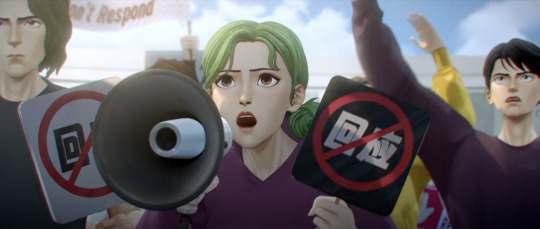
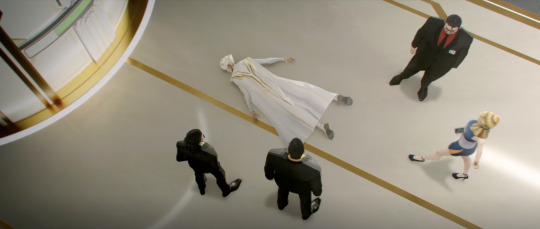
Through the timeline, we know that it has been 41 years in Lin Ling's arc (while in E-Soul it has been 36 years) since the Commission was created, with the concept of heroes being created by the trust value was only 5 years before the commission started. It’s not a surprise on why there would be a Commission of sorts by keeping everyone in check.



In the trailers, one of the CEOs spoke on how superheroes should be monitored or be placed in strict management is backed up by how they want the system managed. I don’t want to get deeply political with just the implications of what the MG CEO said, “We can’t let heroes grow rampantly on the platform.”
There was always a power dynamic to the CEOs > Heroes > Civilians (Heroes and Civilians can be changed depending on the setting). To them, there’s always a need for ‘balance’ or a class system for the others to stay “down” like the rankings of the heroes. Sure, the ranks are controlled by the civilians and the fans, but who controls the heroes the most are the companies.
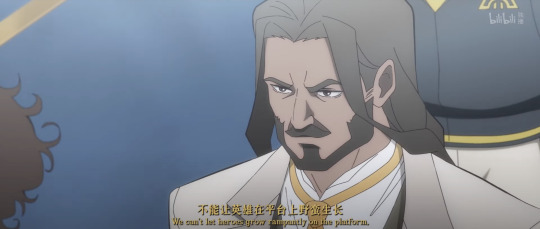
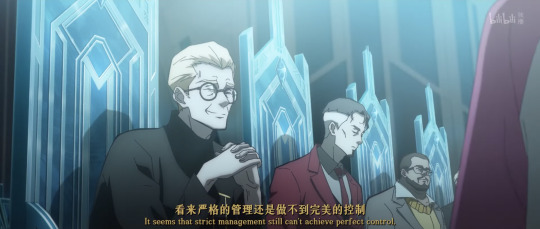
It could be pointing to X’s situation where the Commission could possibly feel threatened by the fact that X is a freelancer, it has been 2 years since being the Top hero, and his quote in one of the trailers was “It’s time to tell the truth.” What does that mean technically? It’s almost the same goal as the Enlighter trying to expose Nice, but this feels more global to tell the truth. Is it the truth about the companies? The world?
There’s 4 main hero companies: DOS, Mighty Glory, TREEMAN, and FOMO. When Lin Ling skyrocketed to the top with his identity to the public still being a nobody; each of the CEOs talked about him as if he was a product or a fascinating subject. Miss J specifically has talked about Nice being a ‘valuable product’ especially when Lin Ling is about to expose himself being Nice.
News Outlets Around Each Episode
We see many news outlets in TBHX like the TV broadcasts that seem to show up in Episode 1, Episode 2, and Episode 4. These are Focus News and OBTV that broadcasted the news of the Nice/Lin Ling arc. OBTV is seen in the background most of the time, you might even say that it’s the preferred news outlet, while Focus News is only used in Episode 2 in the first part where we see Wreck watching what had happened to Moon and Nice.

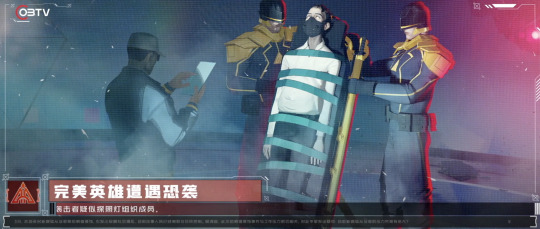
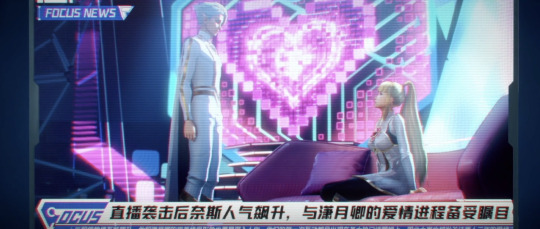
Outside of these news outlets, we know that there are live streams that are created by the hero companies for the fans to give their heroes much higher trust by glazing them through a more biased perspective. We can say that these are operated by the companies’ media outlets like official accounts on social media that will feature a livestream on a script or event such as Episode 2 and Episode 3.

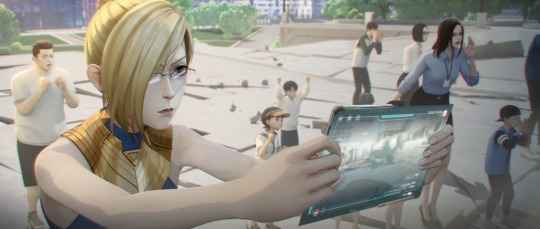
Adding on in the first episode of E-Soul’s arc we find out that there are well known journalists to the point of companies like Mighty Glory being able to hire them in such events for their heroes. While this event is more of an anniversary to E-Soul and an Actor Audition Competition rather than a ‘serious’ one, it’s counted on how companies can hire journalists or buy news outlets for their own gain.
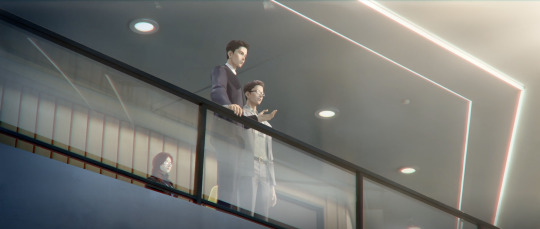
The Corporation’s Control to the Press
In real life, some news outlet companies are owned and run by politicians. These news outlets would lean on a biased perspective to the campaigns of the politicians or lean onto a specific political ideal. Who's to say that in the world of TBHX that happens as well to news outlets becoming owned by hero companies?
It can be beneficial for their heroes and to lose some of the trust value of the other competitors – same company or not. I follow this with the mindset of “Neither of you can be X,” said by Miss J when telling Lin Ling to take the N.10 spot from Firm Man even if he’s Nice’s coworker.
Another thing noticed is that companies have the capability to remove any evidence of a hero’s past or wrongdoing to save reputation. This is in Episode 4 where God’s Eye leaked news of a previous boxer who was playing dirty that was erased by TREEMAN. Of course, these companies have the money to ‘erase’ any controversy said to their workers, especially to heroes. This is similar to Lin Ling’s “fake” suicide post by an account called “Focus” which is a cover up for TREEMAN or to expose the company from the Enligtener.

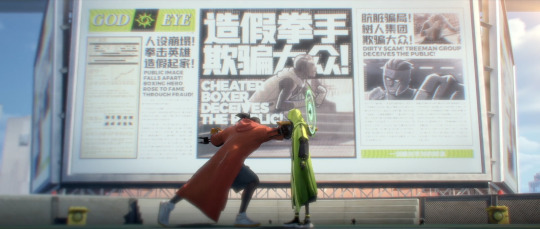
There’s no mention of any politicians in the world TBHX; becoming a hero or being a hero is relevant which holds a lot of power and influence to civilians. They are celebrities, idols, and even could be political. Why I see it could be political is from Queen; her speech in her PV seems like from a political party to promise to give them peace. Heroes aren’t technically there to be politicians, they’re products and concepts, they are there to serve the people, but Queen’s arc could help show that side.
Could it be DOS’s way to control everything? Isn’t almost everything controlled by the Hero Companies? Plus the CEO’s seem to be all knowing on every event.
The Commentary of the Citizens
The only thing that the CEOs are unable to control are the alternative media that the civilians can create
Alternative Media can be beneficial for unknown heroes by getting them into the spotlight or fighting back from the perpetrators like the livestream of Yang Cheng’s fight in Episode 5. The livestream which literally had given Yang Cheng publicity and trust points shown in Episode 6 Preview. (Credits to steIIarevue on the bird app for the translation)
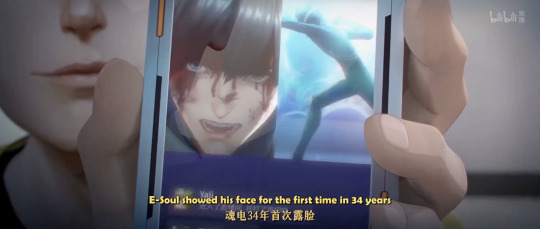
Word of mouth is an important tool in their world. The whole “The Ever Standing Hero” episode is such a run on how it all works with multiple examples: Wolf Girl’s classmates that affected how Firm Man is a masculine guy, Wolf Girl’s comics that twists Firm Man’s image, and lastly Miss J’s dialogue about Imagination.
“Plant an idea to the hearts of the people, then nurture it. It will grow into a sapling… until it blossoms into a concrete thought.”
Each episode you will see responses by the citizens on what happened from the Love Recipe Show to Moon’s fake death to Nice exceeding Firm Man’s trust value to Lin Ling exposing himself to Little Pomelo’s commentary of Yang Cheng’s act and Yang Cheng, himself, to E-Soul. They’re important because they’re the ones that feed on the idea of the heroes.
These are mostly online in chat rooms or from coworkers and friends. A very important social media app that I see lurking around is the FOMO company, since they're also a hero company would there be limits on what the people post about the heroes in the company? Or any mass threads that could possibly ruin the reputation.

The most word of mouth in the PV’s is from X on how OP he is which is how he gets his powers. In the CN BiliBili app or link, X had a video about live streams that gave commentary as well on who he is.
The whole reason why I made this post is from Miss J’s dialogue, itself. It’s a world that can give you so many possibilities by just communication and belief in what has happened. It’s a scary thing that it’s just the norm for them and that what could be fake news or real news can be indistinguishable. Which is why I believe that in this world, journalists or communication specialists are the ones who have such power.
47 notes
·
View notes
Text
I'm gonna admit that I got on Twitter like a big ol' dramatic dork last night and said, knowing full well that Elon Musk was doing exactly this, "If he changes the name to X, I'm out, I can't do this anymore."
Not because "X" is doofy and a terrible branding move, although it is, but because he wants to do THIS shit. Yeah, no, I am not hanging around for your global interactivity "everything app" bullshit. You want me to fucking BANK with you? YOU? You just lost about $30B running a platform into the GROUND by FIRING EVERYONE and doing whatever damn thing popped into your head between shitposts? Are you HIGH? I cannot hang around for this "tech king of the world, 420 blaze it lmao" bullshit. I could not stay at my beloved Livejournal after SUP said all the users would be subject to Russian law in 2017. I know The Moment when I see it. I can't do this.
I admit, I might go back every few months and say "Hey, I posted XYZ on any platform but this, please leave this godforsaken place," and I don't want to delete my accounts. I've been on Twitter since 2008, and I have a ton of livetweet threads (on my main and also on an alt for that purpose. Remember that time I livetweeted the Twilight gender-change book? That glorious trainwreck?). I've saved some of them via Thread Reader PDF downloads, but there are still more to get. I don't want to utterly destroy book and TV discussion we did over there.
I haven't used Twitter regularly since maybe 2016 (about the time the post-Gamergate alt-right really moved in), but the conversation and community, decentralized though it was, before that--we're going to lose the last vestiges of that, the way everyone on Reddit was upset about losing the collective knowledge over there. And I'm so fucking angry about it. I'm so angry. I immediately came back here the week he took over last year because I knew, I KNEW, somehow that Twitter would be destroyed. I just thought it would burn down in a smoking heap of rubble, not turned into a shambling tech zombie under a different name. I just. I can't do this anymore.
Also, shut the fuck up, Linda Yaccarino. Just because you can put Elon Musk's nonsense into coherent verbiage doesn't mean "a global social media/marketplace/banking system/walled garden that's basically X-Treme AOL" isn't a fucking nightmare. I hope the EU bans the fuck out of you both. See you in bankruptcy court.
993 notes
·
View notes
Text
👩🚀Effects of Fama ☄️
(how it affects a celebrities birth chart)
- BASED OFF MY OBSERVATIONS
- Today, we will discussing ways fame can be predicted in a birth chart and how it plays out in real life. We will be discussing fama returns and much more. I’ll possibly make this into a mini series if y’all want more. Astrologers and viewers please comment your thoughts below❤️.
———————————————————————————
Doja Cat
In 2018, Doja Cat became famous when her song “moo” went viral on social media as an internet meme. During that time, her fama had already returned to its original place in the chart. After “moo”, she went on to release “Juicy”, “Say So”, and many other tracks. When Doja Cat released her highest selling album “Planet Her”, she was the center of public eye and her fama was transiting in her 10h (fame, publicity, reputation, legacy, etc).
BIRTH CHART CONFIRMATION: Doja Cat confirmed it on her live

—————————————————————————————————————————
Beyoncé
In 1997, when Beyoncé was in Destiny’s Child, they released a song called “No, No, No”, which became their first breakthrough single. The single reached #3 on the billboard hot 100. During that time, her fama was about to return to its original place in the chart. After her fama had its return, Destiny’s child released an album called ,” The Writing’s on the Wall” and it’s their highest selling album as a group. When Beyoncé went solo and dropped dangerously in love, she was about to go through another fama return in her career.
BIRTH CHART CONFIRMATION: Her birth book which she released on the Internet

—————————————————————————————————————————
Lara (Katseye)
- Before joining Dream Academy and Popstar Academy, she already had a following on social media due to her singing videos; Which is how she was scouted to be in the group. She is the main vocalist of the global girl group katseye. She blasted in stardom when she was on Dream Academy. The show debuted on TV in September 2023 and Popstar Academy debuted in August 2024. During that time, her fama was in her 10h (placidus), she was shown to a massive global audience for the 1st time. When the Dream Academy Finale came around, when the final group line up was chosen, her fama was transiting over Venus in the 11h. The 11h represents GROUPS of people, the fans, social media, and more. Sagittarius represents travel, knowledge, expansion, and more. Venus represents love, romance, music, beauty, and more. She was one of the fan favorites (hint: Venus (love, music, etc.) 11h (fans)); which is how she was picked to be in the group (hint: Sagittarius (global/travel), Venus (music), 11h (groups of people, fans, etc))
BIRTH CHART CONFIRMATION: Weverse Video of Katseye talking about their rising and astrology placements

————————————————————————————————————————-
Overall Observations🔎
- I noticed celebrities tend to come into the spotlight when they go through a fame return. When a celebrity is in the height of the public eye, they tend to have their fama transiting in their 10h, 11h, or 1st house. I noticed if you wanna see when a celeb will blow up or be in the height of the public eye. You can always use fama and watch how it transits in the house.
———————————————————————————
Feedback
Thank you so much for taking your time to read and engage with this post. If there’s anything that I missed, please let me know. If you have any celebrity suggestions that you want me to do, please comment it down in the section. I would love to hear everyone’s thoughts and opinions.
34 notes
·
View notes
Text
𝕺𝖕𝖕𝖔𝖓𝖊𝖓𝖙 𝖙𝖔 𝕺𝖇𝖘𝖊𝖘𝖘𝖎𝖔𝖓 𝖔𝖓 𝖆 𝕸𝖎𝖘𝖘𝖎𝖔𝖓|| Part 1
The Enemies We Became ────୨ৎ──── ETHAN HUNT x FEM READER
Summary: You are an agent who works for the IMF. After you received your mission, you were informed that Ethan Hunt had recruited you to his team. However, bitter pasts haunt you throughout the mission. And it's all up to you and Ethan to set them right as you and the team try to hunt and stop the Entity from starting a nuclear war between the countries of the world.
Genre: Enemies to Lovers, Slow-Burn, Ethan hunt being an ass towards the reader ( well, at first😉), Mission: Impossible ( Dead and Final Reckoning)
Warnings: Nope
Word count: 1142 (it's short, sorry)

You were in an IMF safehouse. Always appreciated them. They were just as beautiful, functional as your own house. You were seated on the couch, a black leather couch, with recliners and all. You were staring at the photos you hung up on the wall. Pictures you took when you were in France, London, and many other places with your Ex-bestfriend,Ethan Hunt. Emphasis on "Ex", but more on how that happpened later. It hurt you every time you glanced at those pictures. Yet you have no idea why you hanged them anyway.
As you were lost in your thoughts, you heard a knock on the door. 'Ugh! It's 5 in the morning, who the hell would it be? You groaned to yourself. You headed for the TV cabinet and grabbed your gun, well, it's a precaution, and walked silently towards the door, looking through the peephole to see who it was. You sighed at the sight of a mailman waiting patiently with a box in his hand. You opened the door, finger on the trigger of the gun behind your back.
The mailman stands straight, as if he's a military officer.
"The night speaks in silence, ‘They will come for you.’ But I do not flinch. I do not run. I reply with no words — only fire. For I am not the hunted."
He says with a misty voice. You then realise he is sent from the IMF to deliver a mission package. You were taught all of these 'epic and poetic' when you were a trainee at the IMF.
" I am the Reckoning." You answer.
At this, he hands you the package and walks away, into the gloomy surroundings as you shut the door behind you.
'A new mission.' You thought to yourself, sighing. You had only finished your solo mission a week ago. God! There's always some bastard trying to bomb the world!
You head into your bedroom, package held tightly in your hand. You place it down on your desk, pulling up a stool and sitting on it. You tear open the package, careful not to disturb the contents inside.
It's a book. 'Red Sparrow' to be exact. You flip it open to see a big hole after the first 20 pages. It has a tablet inside it that you turned on to play a voice-recorded message.
"Good morning, Agent. A rogue intelligence—non-human, autonomous, evolving— The Entity, has breached containment. It sees everything. It hears everything. And soon, it will decide everything.
Global powers are in a silent race for control. Some seek to own it. Others, to destroy it. But only one man holds the key… and that man is Agent Ethan Hunt."
At the use of his name, you clenched your jaw, looking away, a heavy feeling filling your heart. Turning your head to see his face on the screen, green eyes, messy hair that screams ' run for your life '. His looks did mesmerise you, but that was back then. Now you just hated him for existing.
"Your mission, should you choose to accept it:
Retrieve both halves of the cruciform key.
Prevent global escalation.
Decide whether truth should be known, or erased forever.
You will be working with Agents Ethan Hunt, Benji Dunn, and Luther Stickell.
As always, if you or any member of your team is caught or killed, the Secretary will disavow all knowledge of your actions.
This message will self-destruct in five seconds.
Good Luck, Y/N."
You sighed loudly and shut the book as it combusted by itself.
'Working with Hunt again!', you exclaim to yourself. You were annoyed. Extremely annoyed. What annoyed you even more was a Morse code letter in the book. It was a letter from Ethan. Gosh, you hated him, you are literally not on speaking terms, and he had recruited you to the mission because of your "talent" (at least that's what he wrote in the letter). You didn't want to go with him, you absolutely didn't. But a part of you says you have to, not for him, but for the entire world. So you did. You packed your bags to meet the team at the IMF safe house near the Abu Dhabi airport at 10:06 am.
IMF had provided you a private jet to Abu Dhabi, and a safe vehicle to go the the safehouse. You twisted open the doorknob with a key given to you in the plane, and saw Benji Dunn in the living room. He was, as usual, sitting with his laptop on his lap, the green light from the screen accentuating his features. He turned his head toward you slightly with furrowed eyebrows, which you were sure was the face of a confused man trying to figure out who was at the doorway. As soon as he recognized your face ( you worked with this same team a bunch of times, so it was like a good reunion, well, at least with "some" of them), his face broke out into a big grin. You gave him a grin, too, as he set his laptop on the table and came running to you, giving you a HUGE hug, swinging his arms around your neck as you swung your arms around his waist, still grinning.
" My, my, if it ain't Benji Dun,n" you said, setting your bag down.
He gave a chuckle." Well, it's me alright, definitely not a masked guy." he said as he tugged at his own cheek to show that he's not wearing a mask or something.
You smirk and not your head at his stupidity. He was always there for you, like your brother.
" I missed you, Y/N." he said, giving you another hug. " Me too, Benji" you said. You broke out of the hug, and you and Benji settled on the couch.
" Where's the other guy?" you asked, looking at the computer, with the least amount of bother in your voice.
" He's just in the room, setting up some gear for you and himself." he said, pointing his thumb towards a room at the right.
You nodded. " What are we doing today? " you asked eagerly. You felt ready for the mission, more than ever. Only, it's just the beginning.
" You and Ethan should retrieve the other half of the key from a courier named Delai Hasan," He says, showing you a picture of him on his laptop. You simply nod, but the thing is, you hate going on a mission like this alongside Hunt. 'Why did he always have to be there?'.You thought to yourself
And then you heard footsteps and turned towards the door Benji pointed at some time ago.
There he was, standing as if he saw a ghost, looking at you, Ethan Hunt, your no.1 enemy and rival. Yet you were working on the same mission as him.
#ethan hunt#ethan hunt x you#mission impossible the final reckoning#tom cruise#ethan hunt x reader#mission impossible#mission impossible dead reckoning#slow burn#enemies to lovers#Series
21 notes
·
View notes
Text
Good Omens season 3: sort of saved?
I'm still processing how I feel about this, but for anyone who hasn't seen today's news yet:
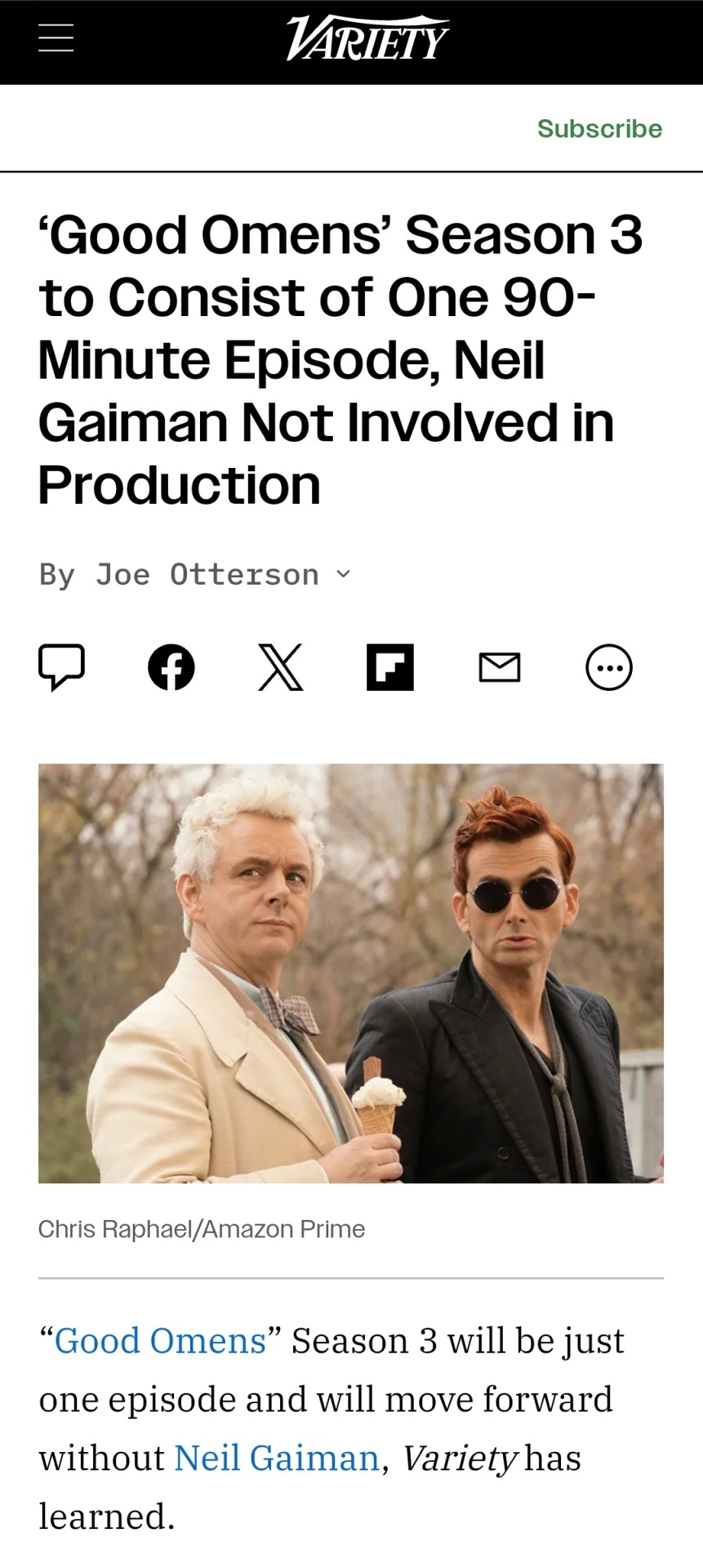
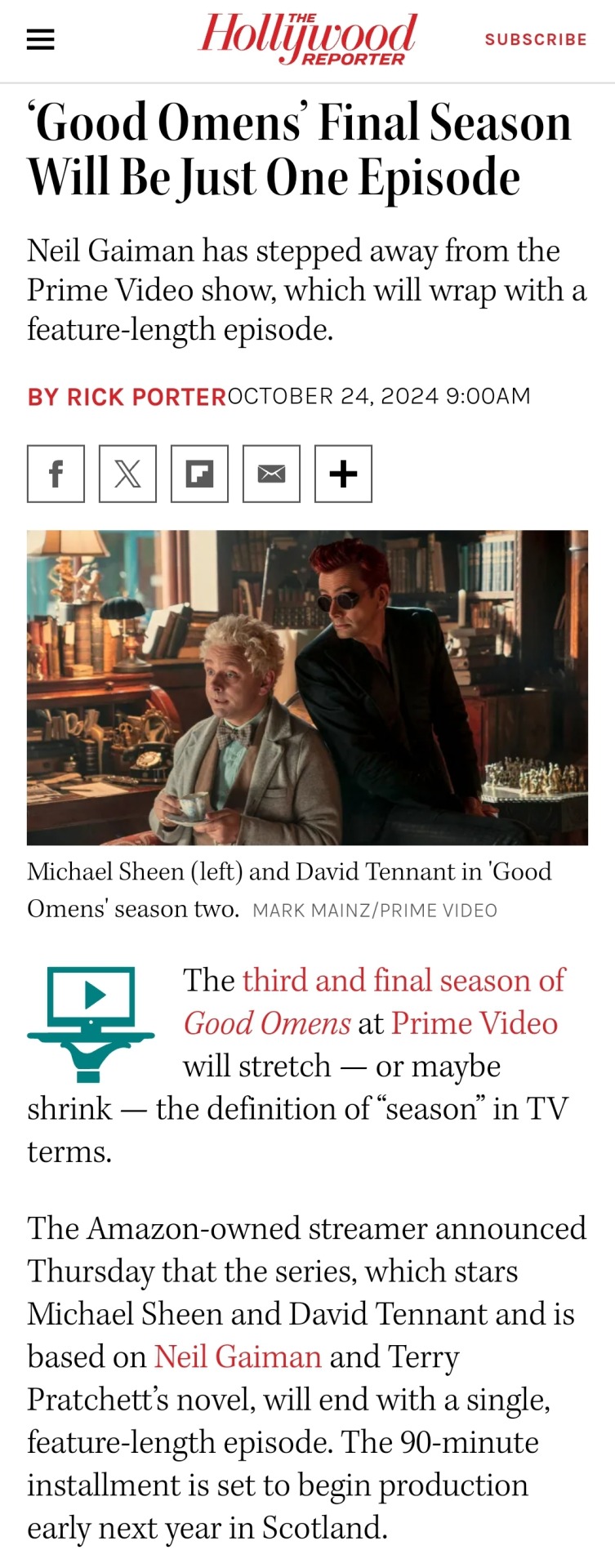
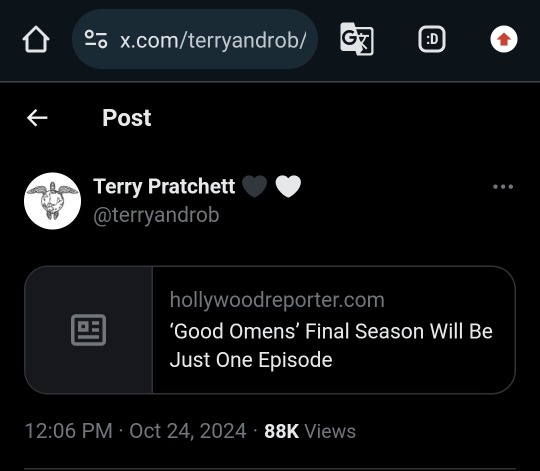
From the Hollywood Reporter:
"The third and final season of Good Omens at Prime Video will stretch — or maybe shrink — the definition of “season” in TV terms.
The Amazon-owned streamer announced Thursday that the series, which stars Michael Sheen and David Tennant and is based on Neil Gaiman and Terry Pratchett’s novel, will end with a single, feature-length episode. The 90-minute installment is set to begin production early next year in Scotland.
Prime Video also noted that Gaiman won’t be involved in production on the series ender (though he did contribute to its writing). Earlier this year, five women accused the author of sexual assault; their claims are detailed in a podcast titled Master: The Allegations Against Neil Gaiman. He has denied any wrongdoing but offered to step away from the final Good Omens to let the production go forward and conclude the story."
From Variety:
"‘Good Omens’ Season 3 to Consist of One 90-Minute Episode, Neil Gaiman Not Involved in Production
By Joe Otterson
“Good Omens” Season 3 will be just one episode and will move forward without Neil Gaiman, Variety has learned.
It was previously announced that Season 3 of the Amazon Prime Video series, which is based on the book of the same name by Terry Pratchett and Gaiman, would be the show’s last. However, production was paused on the third season in September after Gaiman was accused of sexual assault by multiple women.
Now, Prime Video has confirmed that Season 3 will consist of one 90-minute episode, with production expected to resume in early 2025 in Scotland. According to an individual with knowledge of the situation, Gaiman had contributed to the writing of the series finale, but he will not be working on the show once production resumes. He is also no longer listed among the show’s executive producers for the final episode."
Sources: Variety, Hollywood Reporter, Terry Pratchett/Rob Wilkins on X.
Edit: @fuckyeahgoodomens also covered this here, with the text of the Terry Pratchett website press release, which begins:
"Today, Prime Video announced that it has confirmed that the global, fan-favorite series Good Omens will return for a third and final season. They have confirmed, as follows:• The third season will comprise of one 90 minute episode starring Michael Sheen and David Tennant who return as the angel Aziraphale and demon Crowley, respectively."

#good omens season 3#good omens#good omens fandom#aziraphale#crowley#ineffable husbands#resume good omens 3#save good omens#amazon prime#david tennant#michael sheen#terry pratchett#neil gaiman#Ineffable grief
58 notes
·
View notes
Note
hey, so im Palestinian and a strong activist for my people's liberation. i wanted to ask for some info/advice on avoiding antisemitism in my activism for Palestine. im on anon bc i don't want to be called a racefaker for caring about Jewish ppl. i know antisemitism is on the rise right now (and generally over the past few years) and i want to make sure i'm not unintentionally contributing to it.
Hey there! I wanted to start by genuinely thanking you for asking this question. Partially because I don't actually get any well-intentioned or helpful questions in my inbox anymore, but also because I understand the amount of bravery it takes to reach out with a question like that at a time like this.
Next, I want to apologize to all my followers who hate long posts. Judaism is a very complicated ethnoreligious group, antisemitism is a very complicated form of bigotry, and the Israeli/Palestinian conflict is arguably the most complicated international issue that has ever existed. I'm going to try to go through everything as succinctly as possible below the cut-- I am also going to ask other Jews to contribute to and make edits to this list as needed.
And finally-- I'm writing this as though I were speaking to someone with very little knowledge of the subject. I understand that as a Palestinian, you probably know a lot about what's going on here. But I want to make sure that I'm covering bases for anybody else who might need to use this post. So if you're like, Yeah, Obviously I Knew That. Please remember that a fuckton of people on tumblr are engaging in Israeli criticism without obviously knowing that.
There are two primary forms of antisemitism in anti-Zionist spaces-- antisemitic conspiracy theory, and criticism of Israel that no other country receives. The first kind is the easiest kind to pick out, and it makes a nice bulleted list, so we'll start there.
Dual Loyalty. A global stereotype that has skyrocketed since the establishment of Israel, but it's been around for a lot longer than that. Simply put, it's the idea that Jews are more loyal to Israel (or some global secret kabal) than we are to the countries we currently reside in. With I/P, it manifests as the idea that All Jews are directly responsible for Israel or the idea that All Jews secretly support Israel. If you see a Jew who isn't directly engaging in I/P topics, don't ask them what their stance is. Plenty of us have never even been to Israel, and it's fucked up to assume that we're all experts in geopolitics.
The Holocaust was a Fabrication or a Lesson. The idea that Jews made up the Shoah has been around since the Shoah was still happening, and it's always been ridiculous. Today, you'll see three primary lines about this. Either it's that Jews made up the Shoah as an excuse to establish Israel, that the Jews deserved the Shoah because of what's happening in Israel today, or that the Jews "should have learned their lesson from the Holocaust" because now Jews are "the new Nazis". Frankly, I wish goyim would stop treating the deaths of millions of Jews like a TV show. Palestinian deaths are genuinely horrible, but this isn't some kind of "narrative parallel" to the Shoah.
The Kazars Theory, or All Jews are White. This is the DNA test nonsense. The idea is that Israel (or Jews at large) are only pretending to be indigenous to the Levant and that secretly Jews as a whole are actually indigenous to Eastern Europe. It's a lie, started by a German professor of Russian history in the early 1800s. Meanwhile, the vast majority of genetic, historical, and archaeological evidence points to Jewish origins in the Israeli/Palestinian region. There have been literal hundreds of genetic studies on this. Most of them suggest that Jews, even "white" Ashkenazim, are nearly genetically identical to Palestinians.
World Domination. The idea that Jews control the world began with the Protocols of the Elders of Zion in 1903. If you're encountering criticism of Israel that suggests that world governments, particularly European or American ones, are being controlled by Jews, you've got yourself antisemitism. White supremacists like to use the term "Zionist Occupied Government" or "ZOG" as shorthand for this conspiracy. The next two points are born out of this same ideology.
Controlling the Media. The idea that Jews are in charge of Hollywood and/or major news organizations around the world. Regarding I/P, I've seen a bunch of people say something like "Western media outlets won't cover this! (Because you know who controls them!)" only to look online and see... Western media outlets covering it. See also: "My source is tiktok! I don't trust the news!" While it's obviously a fair criticism to say that some Western news outlets certainly have a pro-Israel and anti-Palestinian bias, it's certainly not every single one of them. Reuters and the AP are once again my go-to's here.
Controlling the Financial World. I haven't actually seen this come up regarding I/P, but considering how things have been going, it's only a matter of time. We don't control the banks. We don't control the stock market. We're not in charge of American aid being sent to Israel. HaShem knows that if we controlled all the money, I'd certainly be living larger than I am now...
Those Bloodthirsty Jews. This one arguably started with Blood Libel in the 1100s, when Christians started accusing us of stealing and eating their babies. Straight up, I have met Christians who still believe this in 2023. You see this a lot with I/P-- the Al Ahli Hospital is the biggest example. More than a month later, most reliable intelligence organizations agree that a misfired Hamas rocket landed in a parking lot, killing about 100 people. But a ton of people are still saying that Those Bloodthirsty Jews intentionally bombed the hospital dead on, killing 470 people. I want to be clear-- Israel is killing a lot of civilians. But if you see a bandwagon of people focusing on the one group of deaths that Israel probably actually didn't cause? Consider why.
Causing wars, revolutions, and calamities. Hamas has straight-up got this one in their founding charter. No, the Jews are not responsible for any major global conflicts, revolutions, or counter-revolutions that don't directly involve Israel. We didn't do WWII. We didn't do the October Revolution. See above-- we're not secretly plotting massacres on Shabbat. A lot of people are saying that Netanyahu and Likud let Hamas in to justify the invasion of Gaza... I'd be shocked if that was the case. All evidence points to a classic intelligence failure. We're not orchestrating bloodbaths.
Section 2: Criticisms only levelled at Israel
It's important to recognise that Israeli civilians are no more collectively responsible for the actions of the Likud coalition than Palestinians are collectively responsible for the actions of Hamas. No Palestinian deserves to be stripped of their rights to self-determination in their ancestral lands because of the October 7th attack. Likewise, no Chinese person deserves to be displaced from China because of the CCP's human rights violations in Tibet, Uyghur and Hong Kong. No Russian person deserves to be ethnically cleansed from Russia because of the Kremlin's invasion of Ukraine. But plenty of people do believe that Jews should be stripped of their rights to self-determination in historically Jewish indigenous lands because of the actions of the Israeli government.
After October 7th, I've seen people argue that Israeli babies deserved to be kidnapped because of their national origin. I've seen people argue that Israeli women deserved to be sexually abused because of their nation of origin. I've seen people argue that the seven million Jews living in their ancestral homeland deserve death or displacement because of their nation of origin. Justifying or allowing brutal harm against people because of their national origin is hateful.
I want to make this part very clear-- I do not have an issue with calling out Israeli war crimes or crimes against humanity. But I do have an issue with treating Jewish civilians differently than civilians of other nations responsible for similar horrors. Amplifying bias against a particular group because of that group's nation of origin is called bigotry. Taking a stand against Israeli settlements in the West Bank is anti-Zionism. Collectivizing the label of "white colonialism", and forcing that label upon refugees forced to move to Israel, or Mizrahim with uninterrupted 8,000-year histories in Israel, is antisemitism.
Part 3: Moving Forward
So where do we go from here? If advocating for the destruction of Israel is advocating for the elimination of Jewish self-determination in our ancestral lands, but advocating in favour of the Israeli government is advocating for the elimination of Palestinian self-determination in your ancestral lands, then we must find some middle ground. A solution that allows seven million Jews and five-and-a-half-million Arabs to share the same holy land, without fear of persecution, displacement, or death. For me, this means a few things.
First of all, the recognition that most Israelis disagree with Netanyahu's approach to Palestine, and most Palestinians disagree with Hamas's approach to Israel. And that brings up a question-- why are Likud and Hamas in charge of Israel and Gaza respectively if most people disagree with them? Without getting into the complicated intricacies of the Knesset and the PNA on an already very long post (and without explaining your own government to you), the simple answer is international funds.
Israeli crimes against Palestinians are bankrolled by American Evangelical Christians, who believe that when Palestine is gone, all the Jews will go to Israel, and Jesus will come back to kill the world's infidels. They actually fucking believe that. Meanwhile, Hamas is bankrolled by Iran, which believes that the more often Jews and Sunni Muslims kill each other, the easier it will be for Iranian Shiite Jihad to take over the world. They actually fucking believe that.
So what steps can we take during our advocacy? Not for the destruction of Israel nor the destruction of Palestine, but for America and Iran to get their noses out of our damn business. I genuinely believe that a defunded Likud and a defunded Hamas will allow Israelis and Palestinians to work together for a peaceful two-state or joint-rule solution. Something that will keep my Palestinian friends from feeling like they can't safely travel from Jaffa to Tel Aviv. Something that will allow my Jewish family to visit and pray at the Cenotaphs of Isaac and Rebecca and the Temple Mount. Something that will let Israeli children from Kibbutz Nirim and Palestinian children from Khan Yunis play on the same playgrounds together, instead of sheltering from missile fire.
Frankly, we nearly had that when the Supreme Muslim Council and the Assembly of Representatives began collaborating against the British Mandate instead of against each other. Clearly, it's possible, we just need to stop being pitted against each other by foreign powers.
378 notes
·
View notes
Text
The documentary includes an address to all Australian Police, state and federal, and calls on them to identify and investigate alleged crimes and pursue prosecution of the offenders, without fear or favour. It features videos and reports related to vaccine injuries, statements from government officials and discussions on the safety and efficacy of vaccines. The documentary aims to present a comprehensive view of the alleged crimes, the offenders and the motives behind certain actions taken during the pandemic.
As well as in the description underneath the documentary on Rumble, Forbidden Knowledge TV has provided a list of the sections of the Witness Statement, some details of the reports contained within the sections and hyperlinks to sources, see HERE. The sections of the full two-and-a-half-hour documentary are as follows:
Section 1 – Address to Police
Section 2 – The Victims
Section 3 – The Alleged Crimes
Section 4 – The Offenders
Section 5 – The Motives
Section 6 – The Weapons
Section 7 – The Intent and Means
Section 8 – The Evidence
Section 9 – Call for Investigation and Prosecution
You can find clips from the documentary as well as the full two-and-a-half-hour documentary on Rumble HERE. If you are unable to watch the videos on Rumble, you can watch the full documentary on BitChute HERE. You can read a transcript of the documentary HERE.
After watching the documentary, you might be asking what action you can take. So, Global Truth Network has prepared a template that can be used for you to send to your Australian Member of Parliament or Senator, and to your local Councillors. You can find the templates HERE and HERE.
You can watch the full documentary below.
24 notes
·
View notes
Text

TDA-Gonta Gokuhara
Support me over at Patreon: www.patreon.com/skulljackxiii ------------------------------------------------------------------------------Contestant No. 5: Gonta Gokuhara
Bio: The most innocent participant in the group. He specializes of all forms of knowledge revolving around insects and animals, making him useful in times of trivia based challenges. Though his more practical use is when it comes to his physical prowess and keen eyesight, making him a powerful unit that helps in all kinds of physical situations that his team faces. Other than his body, Gonta's mind isn'y fully there when it comes to judgement and planning. Despite his massive frame and intimidating presence, Gonta is such a soft spoken and gentle person that welcomes and converse with others in such a polite manner. In every interaction he has with anyone, he's generally happy, honest, and tries his best to be as gentlemanly as possible. He's not someone who's easily angered, but because of his simple nature he's very much easily fooled by anyone's words, even the words comes from someone that he knows shouldn't be trusted.
Goal: He didn't think much about the prize money at all because he already comes from a very wealthy background, so he might just donate it to help others instead. His true goal is to be on global television so that his biological family can finally see how prim and proper he truly is. For years now after being rescued from the wilderness, Gonta's parents have always deemed him to be feral and uncultured after witnessing how incapable he is about speaking and acting properly for high society standards (though they themselves never made the effort to help guide him, only able to come home about 2-3 times a year because of their work). So to prove to them how proper he truly is, he tried his best to learn everything about being a gentleman and showcase his hard work to his parents, wherever they are, through a famous tv series like Total Dangan.
#total drama#total drama island#tdi#fanart#danganronpa#drv3#danganronpa v3#total drama action#gonta gokuhara
50 notes
·
View notes
Text
Eric Levitz at Vox:
When Vice President Kamala Harris chose Tim Walz as her running mate, many pundits lamented her decision. In their view, the Democratic nominee should have chosen a vice presidential candidate who could mitigate her liabilities, and balance out her party’s ticket — such as Pennsylvania Gov. Josh Shapiro.
After all, Harris had been a liberal senator from one of America’s most left-wing states and then had run an exceedingly progressive primary campaign in 2020. To win over swing-state undecideds, she needed to demonstrate her independence from her party’s most radical elements. And selecting the popular governor of a purple state — who had defied the Democratic activist base on education policy and Israel’s war in Gaza— would do just that. Walz, in this account, was just another liberal darling: As Minnesota governor, he had enacted a litany of progressive policies, including restoring the voting rights of ex-felons and creating a refuge program for trans people denied gender-affirming care in other states. Picking Walz might thrill the subset of Americans who would vote for Harris even if she burned an American flag on live TV and lit a blunt with its flames. But it would do nothing to reassure those who heard two words they did not like in the phrase, “California liberal.”
But there is more than one way to balance a ticket. Or so Harris’s team believes, if the third night of the Democratic National Convention is any guide. On Wednesday night, Democrats used Walz’s nomination to associate their party with rural American culture and small-c conservative moral sentiments, while remaining true to a broadly progressive agenda. Walz may not be especially distinct from Harris ideologically. But he is quite different demographically and symbolically. Harris is the half-Jamaican, half-Indian daughter of immigrant college professors who grew up in the San Francisco Bay Area. Walz was born into a family whose roots in the United States went back to the 1800s, and raised in a Nebraska town of 400, where ethnic diversity largely consisted of several different flavors of Midwestern white (Walz himself is of German, Irish, Swedish, and Luxembourgish descent). Harris is an effortlessly cool veteran of red carpets. Walz is a dad joke that has attained corporal form.
In her person and biography, Harris represents the America that has benefited unequivocally from the transformations of the past half-century — the cosmopolitan, multicultural nation that has greeted the advance of racial and gender equality with relief, and the knowledge economy that’s taken to globalization with relish. Walz, by contrast, was shaped by the America that feels more at home in the world of yesterday, at least as it is nostalgically misremembered — a world where moral intuitions felt more stable, rural economies seemed more healthy, and the American elite looked more familiar; the America that put Donald Trump in the Oval Office, in other words. Or at least, the Harris campaign has chosen to associate Walz with all of that America’s iconography, attempting to make it feel as included in the Democratic coalition as possible — without actually ceding much ground to conservative policy preferences. The introduction to Walz’s speech Wednesday night looked like it could have been scripted by a chatbot asked to generate the antithesis of a “San Francisco liberal.” A video montage celebrated Walz’s diligent work on his family farm growing up, his service in the US military, skills as a marksman, and — above all — success as a football coach. Democrats leaned especially hard on that last, most American item on Walz’s resume. Just before the party’s vice presidential nominee took the mic, a group of his former players decked out in their gridiron garments marched on stage to a fight song (not to be confused with “Fight Song”).
[...] There is some basis for believing that Democrats might be able to win over a small but significant fraction of Republican-leaning independents by wrapping center-left policies in conservative packaging. Some political scientists have found that when moderate and conservative voters are presented with a progressive, Democratic economic policy idea — that is justified on the grounds that it will help uphold “the values and traditions that were handed down to us: hard work, loyalty to our country and the freedom to forge your own path” — some do respond favorably (as do liberal voters, who take no offense at such abstract, traditionalist pieties). Whether Walz tying himself to rural American symbology — or Harris tying herself to “Coach Walz” — will be enough to blunt Trump’s attacks on the Democratic nominee’s supposed “communism” remains to be seen. But the Democratic ticket is at least trying to make right-leaning Midwesterners feel like they belong (even if they do not think like Democrats do).
Tim Walz’s DNC speech last night reflects a broader trend of Democrats reclaiming freedom and patriotism while also selling its liberal agenda. #DNC2024 #HarrisWalz2024
See Also:
HuffPost: With Kamala Harris, It’s Cool For Liberals To Be Patriotic Again
21 notes
·
View notes
Note
okay so i'm not british (i'm just a teenage girl hungry for knowledge 😔✊) but i watched one video and as a result i've been consuming an insane amount of new labour media for the past week even though i've never been interested in uk politics besides keeping up with global news LMAO i genuinely wanna know more so where do you think i should start with books films etc 😭
hiii!! excellent question id be more than happy to help! this will be sort of an overview with general recs for newlab beginners (why am I treating this like its a profession omg) so just lmk if you want more specific recs + I've highlighted my favs
books (from the outside)
(by from the outside I mean written by people not directly involved in newlab, so historians/journalists etc)
the two classic newlab texts are servants of the people and the end of the party, both by andrew rawnsley from the observer. provide nice, extensive but not overly fussy histories of newlab from opposition to 2010. good balance of gossip and actual information!
my personal favourite is rivals by james naughtie (bbc reporter), I find the prose in it far more compelling than any other book on this list.
brown's britain (robert peston) is also very good!
you've mentioned that you're not from the UK, so I really really really would recommend reading a book/a few articles on the broader history of the British Labour Party, just so you can understand why newlab was so revolutionary. I quite like keeping the red flag flying
autobiographies/diaries/books from ppl directly involved:
(these will inevitably be more biased)
the new machiavelli by jonathan powell is my absolute favourite self-written newlab book - and you might learn some stuff ant machiavelli whilst ur at it so this is an essential imo
my life our times by gordon brown is another one I really enjoyed, although it's less gossipy than some of the other books on this list. admittedly I do agree with basically everything gordon brown has ever said so this is a very biased review, but I would give it a go!
obviously alastair campbell wrote a load of diaries. I would be careful with which volumes you choose to get - go for the ones published 2010 and onwards bc he made the choice to omit stuff from the first few volumes he published so that it wouldn't' hurt gordon's premiership. also, they're really long and really extensive, so pick which volumes you want to read based on which specific period of newlab you find yourself drawn to!
as a comms/polling fan (boo) I really liked unfinished revolution by philip gould, but this might not be the best book to start with.
damian mcbride's power trip (more diaries) is also interesting
big fan of point of departure by robin cook asw!
I found tony's books excruciating to read but that's bc im crazy and think I know the inside of his mind like its my own so they might be good for you. his new book is FASCINATING but only in the sense of it exposing how big his messiah complex is. don't read any of his books if you're not down to hear about sex and/or technology.
oh a note: mandelson has written books but I don't like him so im not going to recommend them <3
tv/film
tony and gordon aren't really all that into big heartfelt chats about newlab, esp not together, but a few good docs have been made
blair and brown: the new labour revolution (bbc, 2021) - this is a classic, it's where I got my newlab start as a tender sixteen year old politics student u can't beat it! watch this one first
the blair years (bbc 2007)
out of the shadows and we are the treasury (here and here)
blair's thousand days (1 2)
if you're into tbgb, please please please watch the deal. I don't like much of the michael sheen as blair content, but the deal (2003) is so good.
if you want me to rec bits of tv from the newlab years that I think r cool and worth watching then send another ask and ill tell u! but obv theyre not much use if you're just getting into newlab :)
alastair did interviews with tony and ed miliband 6/7 years ago. not all about newlab, but very interesting to watch and observe the dynamics!
podcasts
matt forde of the political party has done interviews with a lot of newlab figures, from tony all the way to the more junior spads. I especially like the joint one he did with ed balls and alastair campbell, and the first tony one. these r less good for actually learning facts about newlab but really like listening to them as a way to sort of get into these ppls heads and observe them in a more casual setting. also a gordon interview asw !
if you can bear listening to george osborne talk (I can but others r more sensible) then political currency is also a good place to get lil tidbits of newlab gossip, bc ed balls is one of the hosts and he's super messy he loves chatting abt gordon.
ideology/boring stuff etc!
ok u can ignore this section if you want but these r some books about the ideology that underpinned newlab - I think it's fascinating!
the third way by giddens (literally the newlab bible and I think the only theory that blair took seriously)
crosland’s the future of socialism!! influenced gb and caused so much internal labour drama so evidently its excellent
if you want a really interesting essay on Iraq I recommend this
podcast on centrism that touches a lot on clinton/newlab/blair etc
oh and just for fun!!!!! here's a playlist of all the songs written canonically actually irl about tony blair.
lmk if you want any other recs!!!!!
16 notes
·
View notes
Text
Something you can do if you’re trying to write an expert in their field but aren’t an expert yourself is to force them into a situation where they have to be resourceful. You still need to research, but for example in Tell Me How Long, half my characters are marine biologists.
I’m not one myself but I’ve taken marine science classes and consider myself more knowledgeable than average on the subject.
But these biologists have to administer life-saving medication to a sick merperson, in a triage environment where the lead doctor is incredibly limited in the tools at his disposal. From my standpoint as a writer, I don’t have to research exact, professional equipment and procedure that would be present in a proper medical facility and for the layman reader, they won’t get overwhelmed by all the medical jargon (in tools, procedure, and environment) that now doesn’t need to exist.
My characters are on a fishing boat forced to use makeshift equipment that you could buy at a department store, familiar objects that most anyone is reasonably familiar with. The doctor does have his own equipment to a degree, but he can't pack an entire laboratory up in a suitcase.
And, if you set a precedent of the expert going “This is not perfect but it’s what we got and I’m doing my best” instead of “I’m the expert and this is the exact and only way to handle this situation” you get more wiggle room a la “well it’s not great but in these circumstances, I believe it and he gets a pass”.
One of my all-time favorite TV shows is LOST, and in it the protagonist is a spinal surgeon, but also the catch-all doctor as the only one qualified in the group of survivors to do any kind of medical treatment. All he has to work with are whatever supplies they crashed with and tools in the environment. I’m not a spinal surgeon, but it certainly looks legit when you’re watching and when it gets jank, well, he has no other options, it’s gonna be jank.
Still consult how it should be done in your research! A broken bone still needs to be set a specific way, whether you have a proper splint or have to build one out of sticks.
I have to know things like nitrates and nitrites and how those levels impact biological systems. I have to know the mechanics of a reef and how global warming is killing them en masse. I have to know marine biology at its basest level and how a medical professional would prioritize care in an emergency situation. But I don't need to be a marine veterinarain with a degree to write this specific scenario.
I also got some wiggle room because there is no proper documentation for how to treat mythological creatures versus if the plot was about bottlenose dolphins, but I set out to write realistic marine scientists, and that demands on some level knowing what I’m talking about.
19 notes
·
View notes
Note
For the Spotify wrapped fic thingie: number 4 with NicoJack (obviously hehe 🤭). Please and thank you 🩵
we have our second charli song! this one is from her lockdown album, and really captures that cabin fever feeling we're all familiar with.... (so tw for mentions of covid if that's something anyone wants to avoid)
[#4] anthems (Charli xcx)
Have sex, me and my Romeo / He says I'm irresistible / I'm gassed up like a Texaco / I ride (x10) it / Sometimes I feel okay, some days I'm so frightened
• If Jack had a nickel for every time his sophomore year in the NHL was put to a halt because of a worldwide pandemic, he'd only have one nickel—but that's one too many for his liking.
• He was just starting to get in a groove, too—well, he considered a point at least once a week as a groove compared to the clusterfuck of a season last year. But now everything's shut down, and they have to stay home, and Jack can't even go to the gym. It's making him go just a tiny bit crazy.
• With all that being said, Nico's been an awfully good distraction. No one was allowed to visit each other in the beginning, when the news from the WHO dropped, and scientists and doctors—along with the general public—were learning new things every hour. Nico started coming over so Jack wouldn't be so alone. They lived in the same apartment complex, after all, and it was nice having some company. This whole thing would blow over soon enough, surely.
• But days turned into weeks. Several weeks. Once the league officially ended the season early, it became clear that this was gonna be the new norm for a while. Fauci started talking about "pods" and all that, but flights home were hard to come by, so Jack stayed put and spent more and more time with Nico. They were living in each other's pockets; they split the cost of groceries and Nico crashed on the couch when they'd gotten carried away playing COD late hours into the night.
• And when you're amidst a global lockdown, unemployed, frustrated, and horny as all hell, discoveries end up being made. It didn't take long for Jack to catch Nico giving him sidelong glances, for their hands to brush when they walked by each other in the hall.
• The other shoe dropped while they were watching the new Pixar movie that skipped theatres and went straight to streaming. It was so easy. Nico's hand fell on his hip while they sat on the couch, and Jack looked over. And like a collapsing deck of cards, it moved so quickly after that.
• It started out as simple, no-strings-attached fun. A good stress reliever. Making out and grinding their hips together to completion while ESPN played old highlights on the TV. Exchanging handies and blowies after dinner and then collapsing in Jack's bed. It didn't take long for them to graduate to fucking. Jack was so nervous the first time, only calmed with the knowledge that Nico was just as nervous, too.
• Nico's handsome—Jack has eyes, after all—and he's a very good lay. But as those weeks turned into months, Jack could feel it blossom into something more. Nico was so kind and caring—even from the start, risking disease to come over and keep his basically-still-a-rookie company.
• Now, he's sitting with his back to Nico's chest, Chinese takeout on the coffee table (because fuck the racists trying to put them out of business), watching Friends. Nico's chuckling at Phoebe and Jack can feel the heat from his soft exhale on the top of his head. And he has to wonder if it'll still be like this when the lockdown invariably ends.
• Nico drops a kiss to the top of his head, and he has a good feeling it will.
10 notes
·
View notes